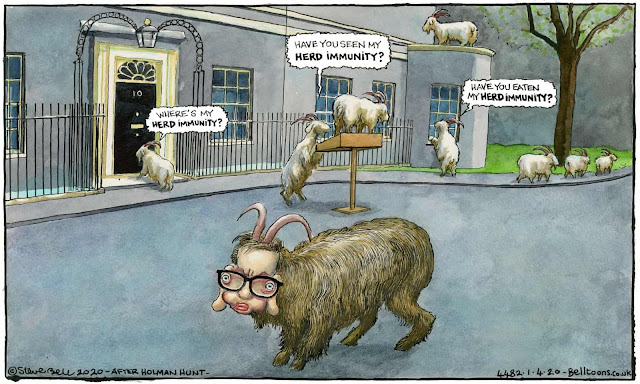Steve Bell’s goats cartoon hits home because “herd immunity” was indeed the worst gaffe so far in the coronavirus emergency, a verbal disaster on a par with Hillary Clinton’s “basket of deplorables” which may have given us the Trump presidency and all that’s followed from that. Herd immunity is a perfectly respectable technical term in epidemiology: “ a form of indirect protection from infectious disease that occurs when a large percentage of a population has become immune to an infection, whether through previous infections or vaccination, thereby providing a measure of protection for individuals who are not immune.“
There are two huge problems with its use in this crisis. First, it contains the word “herd” which is grossly offensive when applied to human beings in a democracy, though perfectly acceptable when used in the abstract about biological systems. It has no place in any political discourse and deploying it was more or less like throwing a hand grenade into a crowded room.
The second problem is not of words but facts. The coronavirus appears to have a lethality around 1-5% of those infected (with much uncertainty until a lot more testing); a vaccine is probably 18 months away, if one can be found that works, so herd immunity will be the de facto result anyway as it is for flu and most other viral diseases. If around 80% of infections are mild or symptomless and the other 20% require hospitalisation, of whom a quarter may be critical, then a strategy based on what could perhaps better be called “community immunity” might have worked (as is being tried in Sweden). It could only ever be morally acceptable if those 20% are guaranteed plentiful and effective hospital treatment, but this was being contemplated by a government which has spent the last decade deliberately reducing the preparedness of the NHS through its policy of austerity.
But in any case it still could never have been politically acceptable in a country like today’s UK in the age of social media, where individualism and dread of such a horrible, invisible threat have largely eroded collective solidarity (already deliberately weakened by successive Conservative governments since Thatcher). Dominic Cummings and Toby Young notwithstanding, most of Johnson’s colleagues realised this – none too quickly – and performed a U-turn whose long-term political consequences are incalculable. Their mass destruction of jobs and small firms might shift us to the social-democratic Left or to the Far Right.
After 2008 the Left utterly failed to make its case for Keynesian reflation and allowed the Tories’ “household budgeting” metaphor to persuade the electorate to vote for austerity. As I write the new Labour leader has yet to be announced, but whoever it is has an even greater challenge before them. Boris Johnson is chameleon enough to take on Keynesian colouring for a while, though it remains to be seen whether he can keep his party with him. But strident Left sloganeering while the virus crisis persists is likely to be counterproductive, and working out a really cast-iron strategy for holding the Tories to account after it ends must be the priority.





I think that, given how many countries were going for lockdown, the u-turn you talk about was inevitable. Apart from the grossly stupid use of the word ‘herd’, to have continued with the original policy would have seemed like, and certainly been portrayed as, leaving the population to get sick. Even Johnson and co. had to be seen to be more proactive. What remains to be seen are the social, psychological and political consequences of lockdown. It’s a huge generalisation, but my impression is that people are coping with it quite well and showing pretty considerable discipline. Who knows how that will last? The political consequences will depend first of all on how effective are the measures that all governments are putting in place to support businesses and individuals. They will then depend on the impact on politics and society of the biggest programme of state intervention and control in mixed economy democracies since the Second World War.
ReplyDeleteThere's not a lot of actual evidence that the 'herd immunity' eugenic approach has been abandoned, except in official statements and promises that seem not to amount to very little tangible. The last month has seen endless promises of imminent mass testing, mountains of PPE, and has committed to vapourware ventilators made by political friends. This appears to be Classic Dom, just another cluster of gambolling unicorns in the sunlit uplands - with just enough actually done to sustain the fantasy.
ReplyDeletes/not amount/amount/
ReplyDeleteTony I agree with the facts you've stated, and as I said above, herd immunity is in fact what we'll get like it or not. The problem is we/they mustn't be seen to like it, hence all the lies, stalling and fairy tales. But this is not a simple matter of political advantage - it's about mass psychology, which in the absence of a vaccine and with limited palliative resources is everything. Mass testing isn't possible, and would be a poor use of remaining resources anyway - but if it were possible it might be counteproductive. Once everyone who has has mild COVID and has 'herd' immunity knows it for sure, their incentive to continue with isolation may fade away, and they may come to resent those who require it to continue. The government isn't really playing with epidemiology so much as game theory...
ReplyDelete